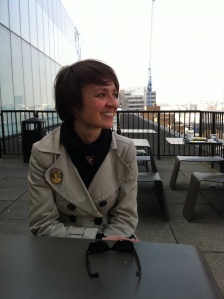I met Alicja over a decade ago. As far as I could remember, she was an open minded, determined and passionate individual. So when I heard that she has started her own fashion line, I said to myself – I have to have a chat with this young lady about her fashion line, called DRESSI. Within a year Alicja has become a very successful clothes designer. She has appeared in prestigious Polish magazines such as Gala and Newsweek and on a well known Polish TV channel TVN. She also had her first catwalk organised in the capital of Poland, Warsaw, which is seen as the heart of Polish fashion. She is a mother to two wonderful little girls. I can’t imagine how she manages to combine both jobs! Full time mum and a designer, impressive if you asked me.
View of the Arts: First of all, could you tell me how DRESSI was founded and what was behind the project?
Alicja: I launched DRESSI to show that casual style can be combined with an elegant one. I have always enjoyed mixing these two styles, it’s comfortable and convenient for me as a mother. I remember I stood in front of my closet, full of clothes, however, I came to the conclusion that I did not have anything useful to wear. Nothing that would fit well and be comfortable at the same time. And then I wondered what I would like to wear that would make me feel great and fashionable so I came up with DRESSI.
View of the Arts: What inspires you when you design skirts, dresses and jackets?
Alicja: My main inspirations are European celebrities who show off their fashion style at big commercial events. By observing them, I think of my customers and how I would like them to look unusual and stunning. I want their style to have something of a stars’ elegance.
View of the Arts: Do you think you ought to have a formal education, e.g. a diploma from a fashion school, to design clothes?
Alicja: I do not think it’s necessary, I am the perfect example! However, I believe, at least in my case, that you should listen, take advice and suggestions from those who are professional in their field e.g. seamstress and other designers. You have to learn how to analyse each and every piece of advice that is given to you.
View of the Arts: What is so special about being a fashion designer?
Alicja: The nicest feeling of being a fashion designer is that when I see my lovely customers in my designed clothes my heart beats faster with an excitement. Also, satisfied customers make my work easier and more pleasant.
View of the Arts: Running your own fashion line must be hard. It involves primarily design, manufacture, sales, finance and advertising. Which of these five aspects, according to you, is the hardest to achieve?
Alicja: I can not really say which of these factors are harder to achieve. Each aspect is important and difficult, all you need to do is to plan and implement it consistently in your fashion line. You have to take each step into consideration very carefully if you want your company to prosper perfectly.
View of the Arts: Do you think that women have started to dominate the fashion world?
Alicja: I am not sure about that to be honest with you. It would depend on the country you live in. Eastern Europe has changed drastically in 1990s. We have opportunities to become someone big in the fashion world dominated by men. Now, in the 21st century, we are more independent and creative. Which definitely allows us to do significant things in our lives.
View of the Arts: In addition to DRESSI, you are also busy raising your two wonderful daughters. Tell me how do you cope? Is it all possible, being a designer and full time mum?
Alicja: This is probably the most difficult aspect of running the business, I must admit that it is really difficult to reconcile the responsibilities of running DRESSI and being mum to my lively little girls. Nevertheless, I always find strength, thanks to it my dreams are coming true.
I, personally, found Alicja’s designs super comfortable. I have a coat, which is wonderful and beautifully sewed. And it is the most cozy and fashionable thing in my huge wardrobe! Please do not ask me what else I have got in it. Have a look at Alicja’s website. It is in Polish, however, it can be easily translated into English by using Google translator. It is worth visiting!
Written and interviewed by Maggie Gogler
Edited by Roxy Simons

Pictures courtesy of Alicja Czarnecka, http://www.dressi.pl and Newsweek






















